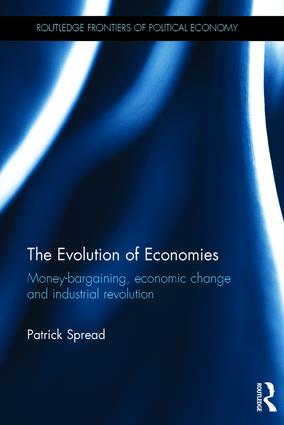The evolution of economies
Download the WEA commentaries issue ›

Joseph Stiglitz concludes one of his articles on asymmetric information with the comment:
Finally, I have become convinced that the dynamics of change may not be well described by equilibrium models that have long been at the center of economic analysis…Dynamics may be better described by evolutionary processes and models, than by equilibrium processes.1
Some heterodox economists will think to themselves ‘about time too’. Ever since Veblen asked in 1898, ‘Why is economics not an evolutionary science?’ economists have been trying to make economics an evolutionary science. Nothing could be plainer than that economies evolve. If economic theories are to explain realities, they must explain economic evolution.
Evolution means Darwin and natural selection. Attempts to develop an evolutionary theory of economics have consequently sought to adapt Darwin’s theory to the economic sphere. The transfer looks easy in terms of ‘survival of the fittest’. Species struggle for ascendancy in the biological jungle and people struggle for ascendancy in the economic jungle. But while species struggle in an impassive environment of biological law, the economic struggle seems driven by human volition and ambition. A more sophisticated approach takes the biological sequence ‘variation-selection-transmission’ and seeks factors in the economic world that might vary, be selected, and be transmitted. Veblen identified ‘habits of thought’ for this role. His followers have seen ‘routines’ and ‘rules’ as the variables that generate evolution. But routines and rules are difficult to portray as the drivers of an evolutionary process. They tend to stabilise activity, rather than change it. Veblen saw that ‘habits of thought’ could lag behind the times and inhibit change. It is difficult to explain actual historical economic evolution through changes in routines and rules.
Here, then, is a new attempt to provide an evolutionary economics, utilising the theory of support-bargaining and money-bargaining introduced to WEA members in Newsletter 2-6 of December 2012. Support-bargaining identifies a sense of individual insecurity as a primary psychological trait. To alleviate this sense of insecurity, individuals seek the support of others, thus creating groups. The ‘bargaining’ arises because individuals compromise as little as possible on their own opinions and behaviour in order to gain the support they need from the group. Support-bargaining gives rise to a process of cultural evolution, by which ‘money’ and ‘money-bargaining’ have been created. Both support-bargaining and money-bargaining are situation-related. People determine their interests and requirements by reference to their present circumstances. This gives a natural evolutionary dynamic. Societies evolve from situation to situation. The Evolution of Economies: Money-Bargaining, Economic Change and Industrial Revolution provides a clear account of the process.2

The centrepiece of the book is a re-interpretation of the industrial revolution. It is argued that the essential of the revolution was the transition from a society dominated politically and economically by landowners to a society dominated in the economic sphere by companies. Companies function as specialist money-bargaining agencies, formatting to meet a viability condition. This concept of companies was set out in a recent article in the Cambridge Journal of Economics, reprinted in a WEA E-Book.3 Economic historians are for the most part mercifully free from the bondage of neoclassical economic theory, but the failure of neoclassical theory to identify the importance of companies has caused historians to miss their central importance to the industrial revolution. The historians of the industrial revolution missed the essential flux of the revolution. The emphasis has been on structural change, technology, factories, steam power, etc, but without a strong focus on companies the industrial revolution is not well understood. It is argued that company formats in cotton production, iron production and railways constituted the essential factors in the British national industrial revolution, and company formats in shipbuilding and shipping services constituted the essential factors in the subsequent global expansion of trade.
The evolutionary theory of support-bargaining and money-bargaining gives a new perspective on the old theory. ‘Intellectual support-bargaining’ is the process by which theories are developed in accordance with the situation and interests of the developers. All theory is ‘interested’. This is particularly apparent in the theory relating to foreign trade. David Ricardo developed his theory of comparative advantage in the context of his campaign in the British Parliament for repeal of the Corn Laws. He assumed a barter economy, in which advantages of comparative productivity would dictate production patterns. But in the context of a money-bargaining system, unit costs dictate which companies are ascendant. Weakness in productivity can be offset by adjustment to wage rates to give competitive unit costs. Furthermore, in an evolutionary system, advantage is never fixed. Companies evolve their formats in accordance with changing circumstances. The German economist Frederick List argued that British adoption of ‘free trade’ was no more than partisan cunning – as the dominant trading nation, Britain was bound to gain advantage from low tariffs. Post-war experience of international trade confirms the functioning of a money-bargaining system rather than the commitment to ‘comparative advantage’ and ‘free trade’ that is so prominent a part of mainstream rhetoric.
The idea of money-bargaining challenges also Keynes’s analysis of equilibrium levels of employment. Keynes defines involuntary unemployment, savings as the residual of income after consumption and the marginal efficiency of capital in reaction against or in the context of a ‘classical’ theory. But understood in terms of an evolutionary money-bargaining system, the definitions are misconceived. Economies do not function in the way Keynes portrays. Companies as bargaining agencies order their investment differently to the ‘firms’ of classical economics. Their formats incorporate technology as critical components. Keynes defines by reference to his ‘classical’ theory, and then treats the definitions as the real thing, so that they confirm his thesis. His comments on the ‘socialisation’ of investment seem reasonable in the ‘classical’ context, but are close to absurd in the context of evolutionary money-bargaining.
In spite of the manifest relevance of a theory of evolutionary economics to the observed functioning of economies, the existing evolutionary theories have had little impact on mainstream economics. They have failed entirely to turn mainstream economics into a new course. This failure must in large part be attributed to failure to provide the strong theory necessary to displace an existing theory that is so thoroughly institutionalised, propagating its misconceptions from generation to generation. That alone is justification for the presentation of a new theory of the evolution of economies. If the above ‘rings any bells’, it is hoped that those who hear them will investigate the new theory in depth. Stiglitz, no doubt, will be delighted to find his conviction substantiated in historical detail.
_______________________________________________
- Stiglitz, Joseph E., 2002, ‘Information and the Change in the Paradigm in Economics’, American Economic Review, Vol. 92, No. 3, pp. 460-501, pp. 486-7. Quoted in Spread, Patrick, 2015a, ‘Asymmetric Information, Critical Information and the Information Interface’, Real-World Economics Review, Issue 70, 20 Feb 2015, pp. 121-140, http://www.paecon.net/PAEReview/issue70/Spread70.pdf. Reprinted in Spread, Patrick, 2015b, Aspects of Support-Bargaining and Money-Bargaining, E-Book, World Economics Association.
- Spread, Patrick, 2016, The Evolution of Economies: Money-Bargaining, Economic Change and Industrial Revolution, Abingdon and New York: Routledge.
- Spread, Patrick, 2015c, ‘Companies and Markets: Economic Theories of the Firm and a Concept of Companies as Bargaining Agencies’, Cambridge Journal of Economics, Advance Access published 2 June 2015, doi:10.1093/cje/bev029. Reprinted in Spread, 2015b.
From: pp.7-8 of World Economics Association Newsletter 5(6), December 2015
https://www.worldeconomicsassociation.org/files/Issue5-6.pdf
The evolution of economics is still going on and this will continue until there is a greater degree of stability. How great is should be is somewhat debatable, but we can see today that we don’t have sufficient stability. That means more evolution is necessary. I would like for it to evolve into encouraging a greater degree of honesty and lower amount of corruption, but to achieve this we need to reduce the current opportunities for speculation and corruption that exist. One of the worst sources for corruption is in the speculation in land values. This corruption is when city planners leak away their plans to the speculators for cash, and the speculators then buy up the sites before the plans for building on or around then have been released. Speculation in land values is harmful to the community not because of the profits but because the useful land involved is then held unused for a few years before it can eventually sold into proper use and its opportunities shared instead of being with-held. This adverse process means that the unused land is driving up the unavailability of nearby sites and with them their costs for access and use. Then production costs (for ground rent) rise and so does demand although the higher prices mean that demand is not met whilst many people cannot find work. Thus speculation in land values results in unemployment.
True, routines are the “objects”. The work is in finding the “verbs”, what makes “mutations”, which is innovation and the theory there is vast.
Evolution of Economics (simplified)
free market capitalism 》labour unions 》government regulations 》crony capitalism 》socialism 》communism 》economic collapse 》repeat…